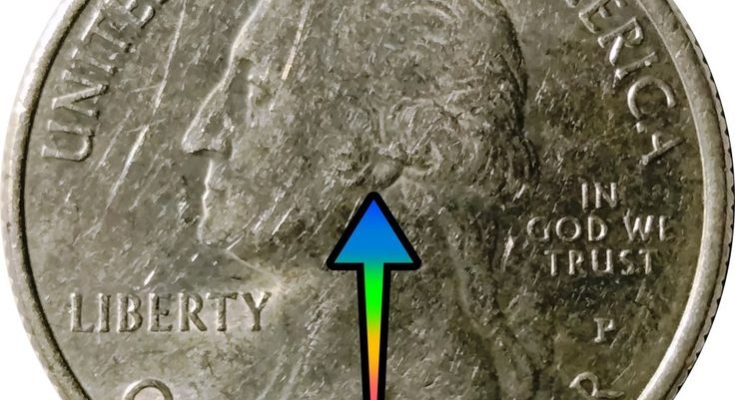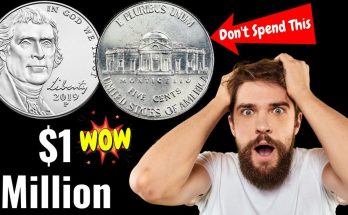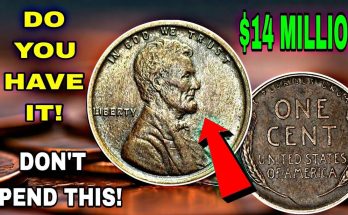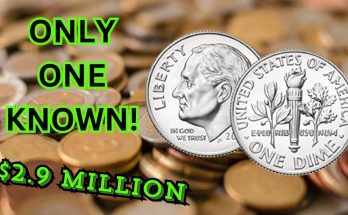💡 The Ultimate Error: A Coin From Two Countries
The quarter that soared past the $100,000 mark was a 1970-S Washington Quarter struck over a 1941 Canadian Quarter.
- A Mind-Boggling Mistake: This error occurred when a fully-struck Canadian silver quarter from 1941 somehow found its way into a press at the San Francisco Mint nearly 30 years later and was struck again with 1970-S U.S. Quarter dies.
- A “Mule” or “Overstrike”: This created a single coin with two identities. Faint details of the Canadian coin, including the portrait of King George VI and the date 1941, are visible underneath the familiar design of the Washington Quarter.
- Extreme Rarity: 💥 This is a world-class error, believed to be unique or one of only a handful ever created, likely by accident or mischief at the mint. Its rarity is the primary driver of its six-figure value.

💲 The “$100,000+” Coin: A Verifiable Legend
This isn’t a hypothetical treasure; it’s a real coin with a confirmed auction history. The unique nature of this two-country, two-date, two-metal coin makes it a “trophy piece” that top collectors are willing to pay a fortune for.
- Key Error Type: 💥 Struck on Wrong Planchet / Overstrike The official term for an error like this can be a “wrong planchet” (as it wasn’t a U.S. quarter planchet) or an “overstrike” (as it was struck over an existing coin).
- Its Value is Certified: A coin of this magnitude is only valuable once it has been authenticated and certified by a top-tier grading service like PCGS or NGC. The certified example of the 1970-S over a 1941 Canadian Quarter sold at a major Heritage auction for over $100,000.
🔍 Quick Spotting Guide: How to Find Your Own Major Error
While you won’t find the exact 1970-S overstrike, you can hunt for other “wrong planchet” errors that are still incredibly valuable! Here’s what to look for on ANY quarter:
- Check the Color and Metal 🤔
- The 1965 Silver Quarter: The most famous “wrong planchet” quarter to hunt for. In 1965, all quarters were supposed to be clad (copper-nickel), but a few were mistakenly struck on 90% silver planchets left over from 1964. If you find a 1965 quarter with a solid silver edge (no copper stripe), it could be worth $10,000 or more!
- Look for any quarter with a copper-penny color.
- Weigh the Coin ⚖️
- A silver quarter (pre-1965) weighs 6.25 grams.
- A clad quarter (1965-present) weighs 5.67 grams.
- If your quarter’s weight is significantly off, it might be struck on the wrong planchet.
- Check the Edge and Size 🧐
- Is the edge correct? A quarter struck on a penny planchet, for example, will be smaller, copper-colored, and missing its reeded (grooved) edge.
📈 Maximize Value: If You Find a Major Error
- Handle with EXTREME Care: Do not clean, drop, or scratch it. Hold it only by the edges. A major error coin is a potential five-figure find.
- Professional Grading is ESSENTIAL: 🛡️ For an error of this significance, PCGS or NGC authentication is the only path. This is not optional. A raw “error” has little value compared to a certified one.
- Sell Through a Major Auction House: 🌐 A certified major error should be sold by a world-renowned auctioneer like Heritage Auctions or Stack’s Bowers to ensure it reaches the right buyers and achieves its maximum value.
📊 Market Snapshot (As of June 2025)
- Trophy Coins Reign Supreme: 📈 The market for unique and dramatic error coins is incredibly strong. These one-of-a-kind pieces are the ultimate prize for advanced collectors and often set personal auction records.
- The Story is Everything: A coin with a fantastic story—like being from two different countries—captures the imagination of the collecting community and drives demand.
🤝 Join Our Community!
- Free Alerts: 🔔 Sign up for our newsletter to see breaking news on major error coin discoveries!
- Live Demos: 🎥 Learn how experts identify major minting errors.
- Resources: 📚 Use our extensive guides to dive deeper into the world of error collecting.
Think you have a wrong planchet or other major error? Share clear photos with our community! 📸



